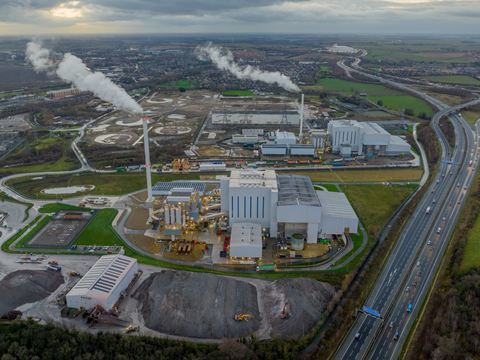
In a step towards installing Carbon Capture and Storage (CCS) technology across its facilities, enfinium is launching a carbon capture pilot at an energy-from-waste site that claims to capture one tonne of CO2 emissions from the plant’s operations daily.
Claimed to be the first of its kind in the UK, the carbon capture pilot features a containerized, scaled-down version of the CCS technology developed by Hitachi Zosen Inova (HZI). enfinium hopes to prove its feasibility at scale and roll out the technology across its six energy-from-waste facilities in the UK to remove CO2 from the atmosphere.
The pilot has been installed at enfinium’s Ferrybridge-1 energy-from-waste facility in Knottingley, West Yorkshire, and will run for at least twelve months. It will gather real operational data on performance, including CO2 capture rate and solvent degradation, and is set to assess the performance of different amine solvents.
It is also expected to contribute towards enfinium’s Net Zero Transition Plan, which lays out a roadmap to decarbonize the company’s own operations and remove up to 1.2 million tons of carbon every year in the 2030s. This is supported by an investment programme of up to £1.7 billion, which will focus on investments in CCS technology across its energy-from-waste facilities.
Deploying CCS at such facilities apparently generates ‘negative emissions’, or durable carbon removals. Biogenic content that has naturally absorbed CO2 from the atmosphere – including such organic material as waste food, plants, and paper – is thought to make up around 50% of the unrecyclable waste produced by society at large; CCS technology is set to permanently capture and store this CO2 rather than releasing it back into the atmosphere, resulting in a net carbon removal.
According to the Climate Change Committee’s Progress Report, the UK must increase its production of carbon removals in order to meet its Net Zero targets. Furthermore, research from the Oxford Institute for Energy Studies suggests that the energy-from-waste sector could contribute up to 8 million tonnes of carbon removals.
“We are proud to have this sector-leading project up and running at our Ferrybridge facility,” said Mike Maudsley, CEO of enfinium. “Carbon capture and storage technology is central to how the UK will be able to decarbonize its unrecyclable waste.
“CCS is also critical to generating carbon removals at scale so the UK can achieve Net Zero. Using carbon capture, the energy from waste sector can provide significant levels of carbon removals and enfinium, with the support of HZI, are taking steps now to achieve this.”
Bruno-Frédéric Baudouin, CEO of HZI, continued: “Working with enfinium to deliver the UK’s first carbon capture pilot at an energy from waste facility is an exciting project. The operational pilot demonstrates our capability to deliver vital decarbonizing infrastructure for the waste sector that is critical to the industry’s Net Zero ambitions.
“The project will meaningfully expand our carbon capture knowledge base and provide a springboard for delivering decarbonization solutions worldwide. Our vision is to enhance decarbonization, circularity and supply security for present and future generations, and this project embodies perfectly what we are striving for.”
“The launch of CCS at Ferrybridge is very exciting to see,” commented Olivia Powis, CEO of the Carbon Capture and Storage Association. “With millions of tonnes of unrecyclable waste produced by the UK, this is an important demonstration of the use of CCS to generate clean power via energy-from-waste, as well as providing a future route to establishing the UK’s greenhouse gas removal market and enfinium have taken a landmark step with its delivery.
“Through projects such as the one at Ferrybridge, the UK will be able to meet the clean power by 2030 target.”
Tracy Brabin, mayor of West Yorkshire, added: “I’m delighted to see the fantastic work being piloted in Ferrybridge, continuing the long tradition of energy generation and innovation in West Yorkshire.
“To see this development from enfinium is massively encouraging, as our own modelling shows a need for carbon capture and storage to help us reach our Net Zero ambitions.
“Climate change is one of the biggest global challenges we face, so it’s vital we find new opportunities for innovation that can help us build a greener, more secure region that’s fit for the future.”
A five-week public consultation will run from today (16th September 2024) until 20th October 2024 to advance the planning and consenting programme for the installation of CCS at its Ferrybridge 1 and 2 facilities. Interested parties can register for the online webinar by contacting decarbonisation@enfiniumferrybridge.co.uk.
The news comes after a warning from the Renewable Carbon Initiative (RCI) that products derived from crude oil and natural gas could have much higher carbon footprints than previously believed. For instance, emissions associated with commodity plastics might be around 30% higher, and the footprint of fossil naphtha could be almost twice as high.
RCI has also recommended in a position paper that a complementary renewable content target be implemented into the Packaging and Packaging Waste Regulation; this is believed to increase the potential of direct carbon capture and utilization in packaging, among other benefits.
Meanwhile, although the EU Parliament approved the European Union’s carbon removal certification framework earlier this year, Cepi asserts that a clear definition of renewable carbon is still needed to achieve full circularity and climate benefits. Using carbon capture, use, and storage to manufacture forest products is thought to capitalize on removing carbon from forests and trap ‘biogenic carbon’.
If you liked this story, you might also enjoy:
The ultimate guide to the Packaging and Packaging Waste Regulation in 2024
How are the top brands progressing on packaging sustainability?
Sustainable Innovation Report 2024: Current trends and future priorities
Everything you need to know about global plastic sustainability regulation














No comments yet